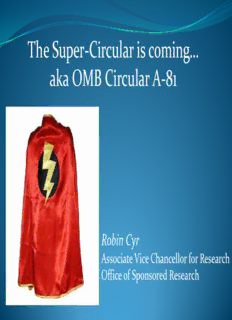
The Super-Circular is coming aka OMB Circular A-81 PDF
Preview The Super-Circular is coming aka OMB Circular A-81
The Super-Circular is coming… aka OMB Circular A-81 Robin Cyr Associate Vice Chancellor for Research Office of Sponsored Research What is the Super or Omni Circular? The Uniform Administrative Requirements, Cost Principles, and Audit Requirements for Federal Awards (Uniform Guidance) were released on December 26, 2013. The Uniform Guidance streamlines and supersedes guidance that was previously contained in eight different OMB Circulars. Federal funding agencies are required to implement the Uniform Guidance. Included in the new guidance are definitions, uniform administrative requirements (both pre- and post-award), cost principles, and audit requirements. Uniform Guidance (2 CFR 200) The Uniform Guidance administrative requirements and cost principles will apply to new and incremental funding awarded after December 26, 2014. Existing Federal awards will continue to be governed by the terms and conditions under which they were awarded. Subpart F, Audit Requirements, will apply to audits of non-Federal entity fiscal years beginning on or after December 26, 2014 ( or the first fiscal year that begins after December 26, 2014). From the university perspective, the Uniform Guidance will supersede OMB Circulars A-110, A-21, and A-133. So what exactly is being replaced? OMB Circular A-133 (Audits) OMB Circular A-110 (Administrative Requirements for Higher Ed, Hospitals and Non-Profits) OMB Circular A-21 (University cost principles) OMB Circular A-87 (State, Local and Indian Tribal Gov. cost principles) OMB Circular A-122 (Not for profit cost principles) OMB Circular A-89 (Catalog of Federal Domestic Assistance CFDA) OMB Circular A-102 (Grants and Cooperative Agreements with State and Local Government) OMB CircularA-50 (Audit follow up) How is the new Circular organized? The new Circular can be accessed in its entirety in the Federal Register at 2 CFR 200 or http://www.gpo.gov/fdsys/pkg/FR-2013-12- 26/pdf/2013-30465.pdf Subpart A – Acronyms and Definitions Subpart B – General Provisions Subpart C – Pre-Award Requirements and Contents of Federal Awards Subpart D – Post Federal Award Requirements Subpart E – The Cost Principles Subpart F – Audit Requirements Appendix What is the basis for the new provisions? Subpart A – Acronyms and Definitions pulls from A-110, A-21 and A-133 Subpart B – General Provisions; A-110, A-21 and A-133 Subpart C – Pre-Award Requirements and Contents of Federal Awards; A-110 Subpart D – Post Federal Award Requirements; A-110 and A-133 Subpart E – The Cost Principles; A-21 Subpart F – Audit Requirements, A-133 Appendix; A-110, A-21 and A-133 So it isn’t all new and as was the case under the old Circulars….. The Uniform Guidance tells us the maximum requirements that the Federal funding agencies can impose And the minimum standards that Grantee organizations must adhere to Who will be subject to the Uniform Guidance? The Uniform Guidance is applicable under awards made directly to an entity as well as pass through entities that are; Institutions of Higher Education Nonprofit Research Institutions Other non-federal entities including States, Local and Tribal governments and nonprofit organizations Note: Per the preamble to the Uniform Guidance, the hospital cost principles may eventually be incorporated in DHHS regulations. Exceptions 200.102 No exceptions can be granted from the Audit Requirements. Only OMB can allow exceptions for classes of awards or non-Federal entities In the interest of maximum uniformity, OMB will permit exceptions only in unusual circumstances Exceptions on a case-by-case basis may be authorized by the awarding Federal agencies only when approved by OMB Federal awarding agencies may apply more restrictive requirements when approved by OMB, required by statute, or when those requirements are codified in the Code of Federal Regulations Definitions The definitions now encompass all requirements (administrative, cost principles and audit) and all types of Grantees Some definitions of note: 200.12 Capital assets now includes software 200.20 Computing devices means machines used to acquire, store, analyze, process, and publish data and other information electronically, including accessories (or “peripherals”) for printing, transmitting and receiving, or storing electronic information
Description: